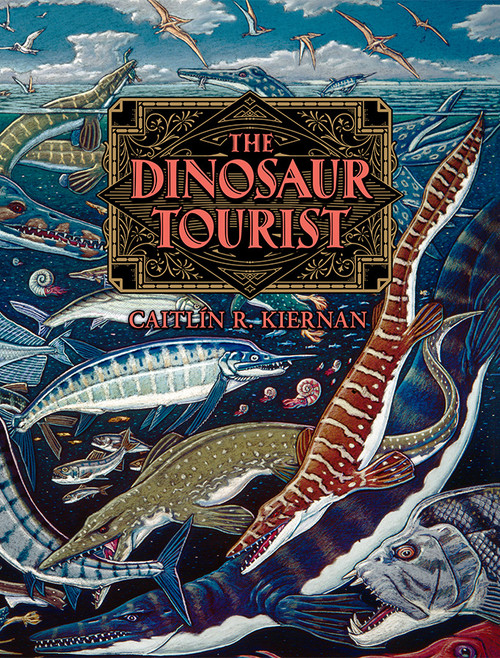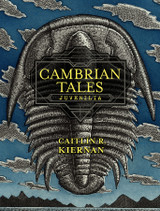Dust jacket illustration by Ray Troll.
Almost nothing is only what it seems to be at first glance. Appearances can be deceiving and first impressions often lead us disastrously astray. If we're not careful, assumption and expectation can betray us all the way to madness and death and damnation. In The Dinosaur Tourist, Caitlín R. Kiernan's fifteenth collection of short fiction, nineteen tales of the unexpected and the uncanny explore that treacherous gulf between what we suppose the world to be and what might actually be waiting out beyond the edges of our day-to-day experience. A mirror may be a window into another time. A cat may be our salvation. Your lover may be a fabulous being. And a hitchhiker may turn out to be anyone at all.
Limited: 600 signed numbered copies, bound in leather, accompanied by the exclusive bonus hardcover, The Chartreuse Alphabet
Trade: Fully cloth bound hardcover
From Publishers Weekly (Starred Review):
“This superb collection of 19 genre-bending reprints is distinguished by gorgeous prose, haunting beauty, and visceral imagery… Kiernan puts her exceptional talent for navigating the dark, cold depths of Lovecraftian mythos to excellent use in ‘Far from Any Shore’ and ‘Excerpts from an Eschatology Quadrille,’ both featuring artifacts that leave chaos and madness in their wake, and the glorious ‘The Cats of River Street (1925),’ about a ragtag group of cats that are the only thing standing between humanity and the tentacled horrors of the deeps.”
From Kirkus Reviews:
“This collection abounds with uneasy psyches, unsettling fauna, and blurred boundaries between the real and the bizarre. Much of Kiernan's fiction exists on the border between psychological horror and the same genre's more supernatural division… Kiernan's densely plotted and atmospheric tales of dread—supernatural and otherwise—make for a memorably unsettling read.”
Table of Contents:
- The Beginning of the Year Without a Summer
- Far From Any Shore
- The Cats of River Street (1925)
- Elegy for a Suicide
- The Road of Needles
- Whilst the Night Rejoices Profound and Still
- Ballad of an Echo Whisperer
- The Cripple and the Starfish
- Fake Plastic Trees
- Whisper Road (Murder Ballad No. 9)
- Animals Pull the Night Around Their Shoulders
- Untitled Psychiatrist No. 2
- Excerpts from An Eschatology Quadrille
- Ballad of a Catamite Revolver
- Untitled Psychiatrist No. 3
- Albatross (1994)
- Fairy Tale of Wood Street
- The Dinosaur Tourist (Murder Ballad No. 11)
- Objects in the Mirror
The Cats of River Street (excerpt)
(1925)
Essie Babson lies awake, listening to the soft, soft murmur of the Manuxet flowing by on its way down to the harbor and the sea beyond. Unable to find sleep, or unable to be found by sleep, she listens to the voice of the river and thinks about the long trip the waters have made, all the way from the confluence of the Pemigewasset and the Winnipesaukee, and before that, the headwaters at Franconia Notch and faraway Profile Lake in the White Mountains of New Hampshire. The waters have traveled hundreds of miles just to keep her company in the stillness of this too-warm last night of July. Or so she briefly chooses to pretend. Of course, the waters of the river, like all the rest of the wide world, neither know nor care about this sleepless spinster woman, but it’s a pretty thought, all the same, and she holds tightly to it.
Some insomniacs count sheep; Essie traces the courses of rivers.
Whilst the Night Rejoices Profound and Still (excerpt)
Of course, the first colonists brought their own sacred days and traditions with them. When their Bussard ramjets and shimmer sails descended from the black into the orange Martian atmosphere, they carried with them the religions and celebrations of Earth. But Mars is not Earth, and beliefs erode as surely as anything. One or another belief adapts to the needs of those who need them, or the belief dies off altogether, to be supplanted by a new, more useful, more appropriate weltanschauung.So it was with the colonist’s children’s children’s children and with the generations that followed after. Worlds turned—more than a hundred years for earth, almost two hundred for Mars—and the old ways were duly supplanted. Meanwhile, across the void, the cradle of mankind rotted away under the weight of half-recollected calamities, and the supply freighters ceased their comings and goings. No one was left to remind the colonists, who were now Martians, of the world their ancestors had forsaken hoping for better lives so far away. The elaborate terraforming schemes of corporations and governments were only ever half-implemented, at best, and outside the sanctuary of the domes, the planet stayed more or less as it had been for three and a half billion years.
Ballad of an Echo Whisperer (excerpt)
A gun shot.
A pirouetting shadow.
Steel wheels rolling on steel rails, rushing not quite smoothly, not silently, over gravel ballast and softwood crossties hewn long ago, then soaked in creosote to form this magic ladder stretching all the way from Penn Station to the city of New Orleans. I do call it magic, the railroad, all 1,377 miles of it. I lie in my narrow upper berth, the sleeper car swaying and jerking side to side beneath me, around me. We’re racing northeast over Lake Pontchartrain not too long past dawn, heading home. Out there, the morning sun has set the estuary on fire, and the white inferno is too bright to look at for more than a few seconds without averting my eyes. There are already (or still) fishermen on the water in their fragile, bobbing boats, casting lines or reeling them in again.
How can they drift in the fire?
How can anyone bear that heat?
The Cripple and the Starfish (excerpt)
Almost three thousand feet above sea level, the ruins of the Overlook Mountain House squat silent and barren on the crest of its namesake. It is a bleak, disowned place, left for timber rattlers and roosting birds, black bears and chipmunks, visited now only by the occasional sightseers curious and intrepid enough to make the two-hour hike from Woodstock. The hotel burned on a February night in 1923, and all that remains is a towering grey right-angle maze of cement poured in 1878, under the direction of architect and builder Lewis B. Wagonen of nearby Kingston, New York. These walls were raised one hundred and thirty-seven years ago, and ninety-two years ago the hotel burned. There is about this lonely place a mute and inescapable arithmetic—dates, altitude, time, geometry. It is the sum of its history, and little else remains. And, too, there are ghosts, of the fifteen women and men who perished in the fire and of four laborers who died during the hotel’s construction. Though, by ghostsnothing more is meant than fading memory, lingering, voiceless echoes trapped forever in empty window casements and in reinforcing iron bars exposed by crumbling concrete and rusting down all the long decades since the fire. Lost souls with names that are nowhere now remembered, faces forgotten, whispers. In the summer, the ruins are wreathed in a riot of green—bracken and saplings and poison ivy, red oaks, mountain paper birch, balsam fir and red spruce, blackberry, blueberry, huckleberry.
Whisper Road (excerpt)
(Murder Ballad No. 9)
It makes me think of skipping stones, the way the pale red light skips along above the tree tops. It makes me think of finding a cobble on the beach, slate or granite or schist, no more than half the size of my palm, smoothed by ages of weather and not ground quite entirely flat. I put my thumb here,and I put my middle finger here,the weight of the stone cradled by my index finger. The stone hits the water, though the pale red light does not quite seem to touch the tops of the trees growing out beyond the edges of the cornfields. There is no moon tonight, no clouds, but no moon, either, and the light is very bright, silhouetted against the southern July sky.
Excerpts fromAn Eschatology Quadrille (excerpt)
June 1969, West Hollywood
It would be a gross understatement to say that Maxie Honeycutt is a nervous man. Cat gets out of bed every morning, he checks his shoes for bugs, and not the creepy-crawly sort, but the sort he imagines the DOD and CIA and the goddamn LAPD leave there while he sleeps. Cat sits down to breakfast, he’s digging in his box of Post Toasties to be sure no one’s planted a microphone at the bottom. One day or another, he’ll be walking down Sunset Boulevard or Ventura and a car’s gonna backfire and Mr. Maxie Honeycutt’s gonna shit himself, then drop dead from a coronary. This will happen, sure as pigs make little baby pigs, this or some other equally histrionic ending for the skinny little man his friends—such as they are—call Paranoid Jack. No one quite remembers why people started in calling him Jack, though the paranoid part is obvious to anybody who’s spent fifteen straight minutes in this cat’s company. So, you’d think he’d do his best to steer clear of weird shit and questionable business ventures with nefarious individuals. You would, however, be wrong. For example, tonight, Maxie’s in a booth at the Whiskey a Go Go, trying to be heard over shitty acid rock and a hundred stoned motherfuckers talking all at once. Across from him, Charlie Six Pack is rolling a joint, some primo shit just come in from Panama. Charlie Six Pack is a good example of the company Maxie Honeycutt keeps. Cat spent seven years up at Folsom for robbery and a concealed weapons charge. Says he didn’t do it, but what the fuck else would he say?
The Dinosaur Tourist (excerpt)
(Murder Ballad No. 11)
The South Dakota summer sky is a broken china teacup, and I have the distinct impression that when I finally stop the car and step outside and dare to let go of the handle on the door, I will fall straight up into that broken china sky. And I will not stop falling until the world below me is so small that I can make a circle of my thumb and forefinger and catch it all inside. And hanging there, I will freeze like a rose dripped in liquid nitrogen or my blood will boil, but I’ll have captured the world’s disc in one hand. There’s country music on the radio, George Jones and Tammy Wynette singing “Golden Ring,” and I turn the volume up just a little louder, to help take my mind off the smell. On either side of this seemingly eternal highway, there’s shortgrass prairie and patches of bare earth pressed flat beneath that brutal, hungry blue broken cup, and I rush past a comical sort of billboard, an old prospector and his cartoon mule, and the mule is luxuriating in a horse trough, and the billboard promises Refreshing! Free Ice Water! at the Wall Drug Store if I just keep going straight ahead twenty more miles.
- artists_list:
- Ray Troll
- authors_list:
- Caitlin R. Kiernan
- binding:
- Hardcover
- book_case:
- None
- book_edition:
- Deluxe Limited
- book_length:
- 312 pages
- book_type:
- Collection
- country_of_manufacturer:
- United States
- isbn:
- 978-1-59606-882-5
- is_subpress:
- Yes
- print_status:
- Out of Print
- year:
- 2018





